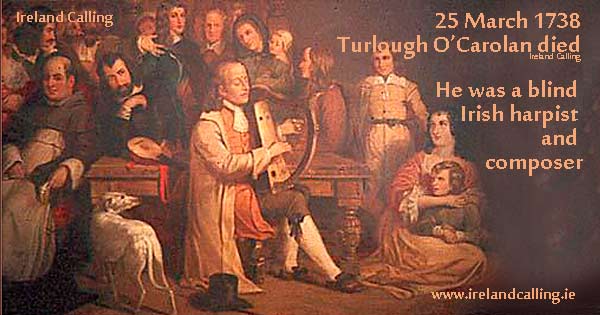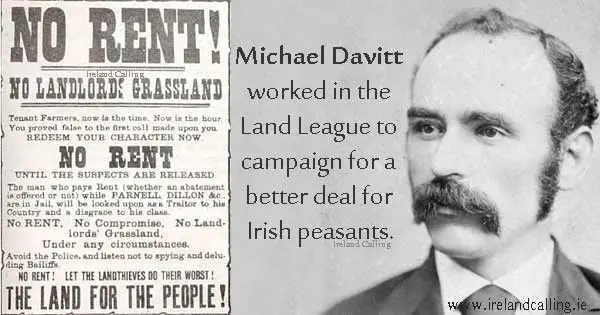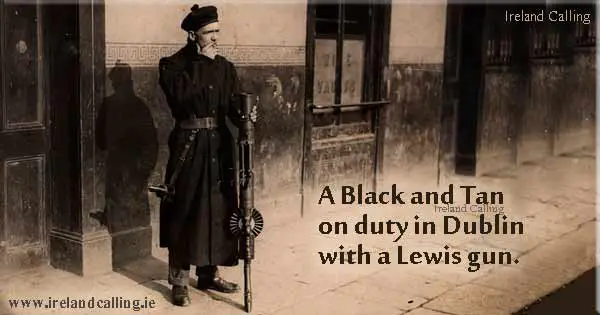march-top.html
1635 A chicken was killed and a woman seriously injured on this day by giant hailstones in County Offaly on this day in 1635. The extreme weather conditions, with some hailstones reportedly being up to 4 inches in circumference, are the worst in Ireland since records began.
* * *
1738 Turlough O’Carolan, a blind Irish harpist and composer, died on 25 March 1738. He contracted smallpox at 18 years which caused blindness. He is considered by many to be Ireland’s national composer. When he was 21, he was given a guide and travelled around Ireland composing melodies and playing his melodies. Many of his songs were written about individual patrons.

He was feted by the Irish higher social classes and was often a guest on their estates – playing music for the hospitality. Funerals and weddings were said to be delayed so he could perform at them. He did this for 50 years.
He called many of his songs “planxties” which was meant as a tribute to a merry host. His work is still performed today by Irish musicians, eg Planxty, The Dubliners, The Chieftains. His book of melodies still sells today. The annual O’Carolan Harp Festival and Summer School commemorates his life and work – this is held in Keadue, Co Roscommon.
When he was 50, in 1720, he married Mary Maguire – they had seven children, six daughters and one son.
Read more on Planxty with videos
Read more on The Dubliners with videos
Read more on The Chieftains with videos
Here’s Carolan’s Dream – played on celtic harp.
* * *
1846 Michael Davitt was born in Mayo on this day in 1846. His family were evicted from their home when he was still young, and moved to Liverpool to start a new life. Davitt grew up with a sense of hatred of British landlords, and the injustice suffered by the peasants in Ireland.

He spent time in prison, and his actions helped to coin the phrase ‘To boycott’.
Find out more about Michael Davitt here
Click here to read about more major characters in Irish history
* * *
1920 On this day in 1920, the first ‘Black and Tans’ officially arrived in Ireland. They were former soldiers recruited by the government to assist the British army in the fight against Irish nationalists in the War of Independence.

They got their name because the uniform they wore was made up of a mismatch of British police and army uniforms, as British supplies were low after the end of the First World War.
Some members of the Black and Tans committed horrific brutalities during the war, even on civilians with no political or military motive. For this reason, they are regarded with hate and anger by many people in Ireland even to this day.
* * *
1939 James McCann was born on this day in 1939. He was a prolific drugs and arms smuggler during the 1970s, 80s and 90s. He has been arrested and imprisoned on numerous occasions in countries all over Europe.
McCann was described as “possibly the most effective arms supplier” to the IRA in the 1970s.
* * *
1998 Robbie Keane, Ireland’s record goalscorer, made his first appearance for the national team on this day in 1998. Keane came on as a second half substitute in a game against the Czech Republic which Ireland lost 2-1.
He went on to play more than 100 games for his country, and has captained the side since 2006. He has played at the finals of two major tournaments, and scored a last minute equaliser in a 1-1 draw with Germany at the 2002 World Cup.
* * *
2001 On this day in 2001, filming began in Dublin for the television drama, Bloody Sunday, a re-enactment of the 1972 tragedy when 14 marchers in Derry, Northern Ireland were shot dead by British soldiers.
James Nesbitt played Ivan Cooper, the man who planned a peaceful march to protest against the government’s ‘internment without trial’ policy, which permitted the arrest and imprisonment of suspected IRA terrorists, without the need for charges to be made against them or allowing them to stand trial.
Nesbitt was asked about recording the film, and the criticism it received from some quarters. He described his experience as “difficult but extraordinary” and “emotionally draining”.
* * *
2003 The Value Menu Restaurant Guide was launched on this day in 2003. Pubs, restaurants and hotels adding several meals to their menus, with the set prices of €10, €20 and €30.
The scheme, from Tourism Minister John Donoghue, hoped to boost the struggling Irish economy by enticing foreign visitors to Ireland with discount meals.
march-bottom.html